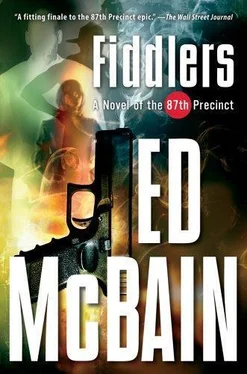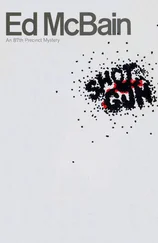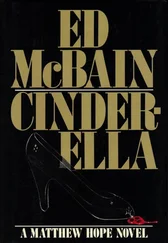Ed McBain - Fiddlers
Здесь есть возможность читать онлайн «Ed McBain - Fiddlers» весь текст электронной книги совершенно бесплатно (целиком полную версию без сокращений). В некоторых случаях можно слушать аудио, скачать через торрент в формате fb2 и присутствует краткое содержание. Жанр: Полицейский детектив, на английском языке. Описание произведения, (предисловие) а так же отзывы посетителей доступны на портале библиотеки ЛибКат.
- Название:Fiddlers
- Автор:
- Жанр:
- Год:неизвестен
- ISBN:нет данных
- Рейтинг книги:3.5 / 5. Голосов: 2
-
Избранное:Добавить в избранное
- Отзывы:
-
Ваша оценка:
- 80
- 1
- 2
- 3
- 4
- 5
Fiddlers: краткое содержание, описание и аннотация
Предлагаем к чтению аннотацию, описание, краткое содержание или предисловие (зависит от того, что написал сам автор книги «Fiddlers»). Если вы не нашли необходимую информацию о книге — напишите в комментариях, мы постараемся отыскать её.
Fiddlers — читать онлайн бесплатно полную книгу (весь текст) целиком
Ниже представлен текст книги, разбитый по страницам. Система сохранения места последней прочитанной страницы, позволяет с удобством читать онлайн бесплатно книгу «Fiddlers», без необходимости каждый раз заново искать на чём Вы остановились. Поставьте закладку, и сможете в любой момент перейти на страницу, на которой закончили чтение.
Интервал:
Закладка:
Baldy kept circling the car like some kind of hawk about to pounce on a rabbit.
‘… six-speed automatic transmission with overdrive, four-wheel antilock brakes
Guy didn’t look like he could afford seventy-four bucks, no less seventy-four grand…
‘… side-seat-mounted air bags, driver and passenger-side air-bag head extension…’
‘What colors does it come in?’ Baldy asked.
‘I have the chart right here,’ the salesman said. ‘Your exteriors come in the Topaz, the Ebony, the Midnight, the Radiance, the Seafrost…’
Guy kept circling the car, running the palm of his hand over the fenders, the hood, the sleek sides…
‘For the interiors, you have a choice of the Cashmere, the Dove, the Ivory…’
‘When can I take delivery?’
‘Depends on whether you plan to buy or lease…’
‘Lease,’ Baldy said.
‘… and whether we can find the vehicle in the colors you…’
‘Find it,’ he said.
* * * *
The sales manager of Beauty Plus’s Lustre Nails Care Division was a man named Jamie Dewes. He was surprised to find two detectives from uptown on his doorstep at four P.M. that twenty-first day of June, because he’d already been visited by detectives from Calm’s Point last week.
‘Terrible thing,’ he told Parker and Genero. ‘Why would anyone want to kill Alicia?’
But in the very next breath, he told the detectives that Alicia thought someone was following her. Veronica Alston, his assistant, confirmed this.
‘Some creepy bald-headed guy,’ she said.
‘When did she tell you this?’ Genero asked.
‘Last week sometime?’ Jamie said.
‘No, before then,’ Veronica said. ‘Around the beginning of the month.’
‘What a month,’ Jamie said. ‘Hottest damn June I can remember.’
‘Said someone was following her?’ Parker said.
‘Said she’d spotted this guy following her, yes.’
‘Where, did she say?’
‘Just following her.’
‘Here? This neighborhood? Or where she lived?’
‘She didn’t say.’
‘How many times did she spot him?’
‘Once or twice.’
‘Did she confront him?’
‘No. Well, I don’t think so.’
‘Did she report any of this to the police?’
‘No. Ronnie? She didn’t call the police, did she?’
‘No,’ Veronica said.
‘Just mentioned it to each of you.’
‘Yes.’
‘Either of you notice any bald guys lurking around outside?’ Parker asked.
They both shook their heads.
‘Know anything about anyone she might’ve been seeing?’ he asked. ‘Any boyfriends?’
‘She recently broke up with this stockbroker guy,’ Veronica said.
‘Would you know his name?’
‘No. Harold something.’
‘When was this?’
‘Breaking up? Around Easter time.’
‘Been dating anyone since?’
Jamie shrugged.
So did Veronica.
‘This Harold something? He wouldn’t be bald, would he?’
‘Don’t know what he looks like,’ Veronica said, and shrugged again.
‘Would anyone else in the office know his last name?’
One of the other sales reps did.
* * * *
Harold Saperstein was a man in his early fifties, they guessed. Wearing eyeglasses and a business suit. He had thick curly black hair, they noticed.
He was just leaving his office when they caught up with him at five that Monday afternoon. They identified themselves, told him they were investigating the murder of Alicia Hendricks…
‘Yeah, I figured you’d be around,’ he said.
… and asked if he would mind answering a few questions. They walked over to a pocket park near his office. The three men sat on a bench, Saperstein in the middle. A waterfall streamed down a tan brick wall behind them. It made the day seem cooler.
‘So tell us how you happened to break up,’ Parker said.
‘You know about that, huh?’
‘Tell us, anyway,’ Genero said.
‘It was The Passion .’
They thought he was talking about the heat of their love affair.
‘The Mel Gibson movie,’ he explained. ‘I told Alicia it was anti-Semitic. She disagreed. I’m Jewish, we got into an argument.’
‘So whose idea was it to split up?’
‘My mother’s. I live with my mother. She said if we were going to fight already over a fecockteh movie, that was just the beginning.’
‘When was this?’
‘Around Easter time. When the fever was at its pitch.’
‘When’s the last time you saw her?’
‘Passover. At my mother’s.’
‘Ever talk to her since?’
‘Yes.’
‘When?’
‘Couple of weeks ago. She phoned to tell me some guy was following her.’
‘And?’
‘She wanted to know what she should do. I told her to call the cops.’
‘Did she?’
‘I have no idea. That’s the last time we ever spoke.’
He was silent for a while. Behind them, the water cascaded down the wall.
‘I hate Mel Gibson,’ he said.
* * * *
‘This would’ve been a long time ago,’ Meyer said.
‘Forty years or more.’
‘Around the time of the Vietnam War.’
The woman they were talking to was Abigail Nelson, Director of Music Studies at the Kleber School of Music, Dance and Drama. She was perhaps forty years old, a trim-looking woman who wore her darkish brown hair in a feather cut. Blue pinstripe suit, like what you’d expect on a bank manager. Alert blue eyes behind oversized glasses.
They were sitting at a long table in the school’s clerical office. Filing cabinets lined the room. Late afternoon sunlight slanted through the windows. Down the hall, they could hear distant music from rehearsal rooms.
‘The sixties sometime?’ Abigail asked.
‘Mid-sixties, probably. We have him in Vietnam during the late sixties.’
‘So this would’ve been before then.’
‘Yes.’
“We wouldn’t even have been in this building. In the sixties, we were still uptown, on Silvermine Drive, near Tenth.’
‘Close to our turf,’ Meyer said. ‘The precinct.’
‘Yes,’ Abigail said, not completely sure she’d understood. ‘He was a violin major, did you say?’
‘Yes.’
‘Alexei Kusmin would have been heading Violin Studies.’
‘Yes, so we understand. Mr. Sobolov was one of his students.’
‘Kusmin was first desk at the philharmonic back then. But he also taught here. Your man would have played violin day in and day out for four years. Well, not just violin. He’d have taken piano as his second instrument, all students in the music department do, even today. And L and M, of course, which is Literature and Materials. He’d also have played in one of the orchestras. There were only two back then, the Concert and the Rep. We have four now. And he’d have taken courses in music history, and - since he was a string musician - he’d have been assigned to chamber music as well.’
‘He’d have been busy,’ Carella said.
‘Oh yes. Our students are expected to be serious about music. Here at Kleber, it’s music - or dance or drama, of course - all day long, every day of the week. Lessons, or practicing, or performing in this or that orchestra… it’s a life, gentlemen. It’s a full life.’
The detectives nodded.
Carella was wondering if he ever really could have become a famous actor.
Meyer was thinking his uncle Isadore had once told him he made nice drawings.
As she led them across the room, Abigail explained that Max Sobolov’s options after a four-year course of study here would have been numerous.
‘We’ve got several major symphony orchestras in this city, you know,’ she said, ‘plus the two opera companies, and the three ballets. There are something like thirty, thirty-five violin chairs in any given orchestra - well, count them. Eighteen fiddles in the first section, another fifteen in the second. That’s thirty-three chances for a job in any of the city’s orchestras. Plus there’s nothing to say he couldn’t have applied to an orchestra in Chicago, or Cleveland, or wherever. A good violinist? And one of Kusmin’s students? His chances would have been very good indeed.’
Читать дальшеИнтервал:
Закладка:
Похожие книги на «Fiddlers»
Представляем Вашему вниманию похожие книги на «Fiddlers» списком для выбора. Мы отобрали схожую по названию и смыслу литературу в надежде предоставить читателям больше вариантов отыскать новые, интересные, ещё непрочитанные произведения.
Обсуждение, отзывы о книге «Fiddlers» и просто собственные мнения читателей. Оставьте ваши комментарии, напишите, что Вы думаете о произведении, его смысле или главных героях. Укажите что конкретно понравилось, а что нет, и почему Вы так считаете.












